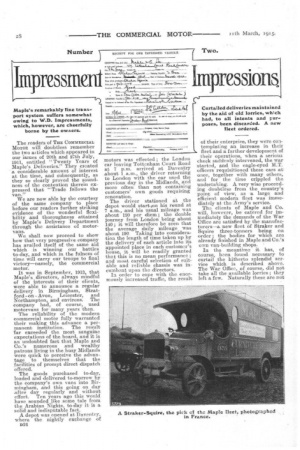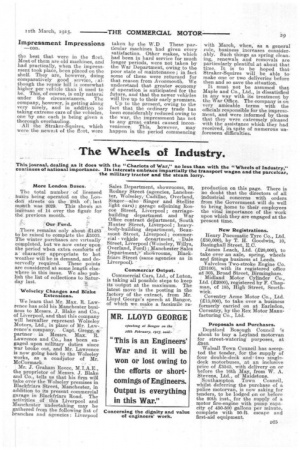Impressmerii (r)
Page 8

Page 9

If you've noticed an error in this article please click here to report it so we can fix it.
Maple's remarkably fine transport system suffers somewhat owing to W.D. Impressments, which, however, are cheerfully
borne by the owners.
The readers of THE COMMERCIAL MOTOR will doubtless remember the two aiticles which appeared in our iszues of 20th and 27th July, 1911, entitled " Twenty Years of Maple's Deliveries." They treated a considerable amount of interest at the time, and subsequently, as they so clearly proved the soundness of the contention therein expressed that "Trade follows the van."
We are now able by the courtesy of the same company to place before our readers further striking evidence of the wonderful flexibility and thoroughness attained by Maple's Delivery Department through the assistance of motorvans.
We shall now proceed to show how that very progressive company has availed itself of the same aid which is winning our battles to-day, and which in the fulness of time will carry our troops to final victory—namely, the commercial motor.
It. was in September, 1913, that Maple's directors, always mindful of the interests of their clients, were able to announce a regular delivery in Birmingham, :Stratford -on-Avon, Leicester, and Northampton, and environs. The company had, of course, used motorvans for many years then.
The reliability of the modern commereial motor fully warranted their making this advance a permanent institution. The result lar exceeded the most sanguine expectations of the board, and it is an undoubted fact that Maple and Co.'s numerous and wealthy patrons living in the busy Midlands were quick to perceive the advantage to themselves that the facilities of prompt direct dispatch offered.
The goods purchased to-day, loaded and delivered to-morrow by the company's own vans into Birmingham, and this going on day after day regularly and without effort. Ten years ago this would have sounded like some tale from the Arabian Nights, to-day it is a solid and indisputable fact.
A depot was opened at Daventry. where the nightly exchange of P24 motors was effected ; the London car leaving Tottenham Court Road at 7 p.m. arrived at Daventry about 1 a.m., the driver returning to London with the car used the previous day in the Midlands,, arid more often than not containing customers' own goods requiring renovation.
The driver stationed at the depot would startam his round at 7 a.m., and his usual mileage was about 120 per diem ; the double journey from London being about 140; it will therefore be seen that the average daily mileage was about 190. Taking into consideration the length of time taken up by the delivery of each article into its appointed pLace in each customer's house, it will be readily granted that this is no mean performance ; and most careful selection of suitable and reliable chassis was incumbent upon the .d5rectors.
In order to cone with the enormously increased traffic, the result of their enterprise, they were coa templaEng an increase in their fleet and a further development of their operations, when a serious check suddenly intervened, the war started, and the eagle-eyed M.T. officers requisitioned these cars at once, together with many others, and for the time crippled the undertaking. A. very wise proceeding doubtless from the country's point of view, as a large and efficient modern fleet was irnrnedia.tely at the Army's service.
The clients of Maple and Co. will, however, be catered for immediately the demands of the War Office are satisfied by the manufacturers—a new fleet of Straker and Squire three-tonners being on order ; the bodies for which are already finished in Maple and Co.'s own van-building shops.
In the naeantinie it has, of course, been found necessary to curtail the hitherto splendid service which is described above. The War Office, of course, did not take all the available lorries ; they left a few. Naturally these are not the best that were in the fleet. Most of them are old machines, and had practically, when the impressment took place, been placed on the shelf. They are, however, doing comparatively good service, although the reenair bill is emnewhat higher per veBele than it used to be. This, of course, is only natura.I under the circumstances. The company, however, is getting along very nicely, and in addition to taking extreme care of the vehicles, one by one each is being given a thorough overhauling. All the Straker-Squires, which were the newest of the &et, were taken by the WD. These particular machines had given every satisfaction. Other makes, which had been in hard service for much longer periods, were not taken by the War Department, owing to the poor state of maintenance ; in fact some of these were returned for that reason from Avonmouth. We understand that greater economy of operation is anticipated for the future, and that the newer vehicles will live up to their early promises.
Up to the present, owing to the fact that the ordinary trade has been considerably reduced owing to the war, the impressment has not to any great extent caused inconvenience. This, however, may happen in the period commenceng with March, when, as a general rule, business increases considerably. Such things as spring cleaning, renewals and removals are particularly plentiful at about that time. It is to be hoped that Straker-Squires will be able to, make one or two deliveries before then and no save the situation.
It must not be assumed that Maple and Co.., Ltd. is dissatisfied in any way with its treatment by the War Office. The company is on very amicable terms with the officials responsible for the impressment, and were informed by them that they were extremely pleased with the assistance which they had received, ira spite of numerous unforeseen difficulties.





















